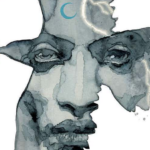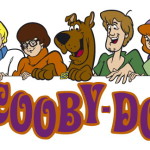
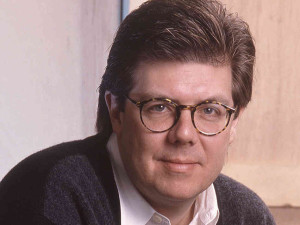 It recently came to my attention that Pretty in Pink (otherwise known as How-Many-Times-Can-Molly-Ringwald-Bite-Her-Lip) and Ferris Bueller’s Day Off were both released thirty years ago. First, this made me feel old and slightly confused. Once I stifled my impending mid-life crisis, I was prompted to re-watch some of the John Hughes movies that were so popular in the 80’s, and remain cult classics today. While Hughes is responsible for many films, he’s most widely known for his movies starring the “Brat Pack,” which focused on the loves, angst, and inner workings of the American teenager.
It recently came to my attention that Pretty in Pink (otherwise known as How-Many-Times-Can-Molly-Ringwald-Bite-Her-Lip) and Ferris Bueller’s Day Off were both released thirty years ago. First, this made me feel old and slightly confused. Once I stifled my impending mid-life crisis, I was prompted to re-watch some of the John Hughes movies that were so popular in the 80’s, and remain cult classics today. While Hughes is responsible for many films, he’s most widely known for his movies starring the “Brat Pack,” which focused on the loves, angst, and inner workings of the American teenager.
I started this endeavor with the intention of writing a nostalgic piece, but upon watching some of Hughes’s films again after many years, I’m more struck by the difference three decades makes in terms of what is considered acceptable and appropriate in popular culture. Specifically in Sixteen Candles, questionable material is presented nonchalantly, and even with the intention of humor, a practice that would be met with extreme derision and protest in a modern movie. But it’s Sixteen Candles! Sacrilege! Right?
So how do we reconcile the movies we watched and loved as kids, with our adult perspectives and experiences that don’t exactly jive with Hughes’s depiction of adolescent life? It would be easy to dismiss the movies as outright offensive, especially in the current environment of highly charged sensitivities. When a movie’s popularity spans the decades, however, the reason for it’s appeal must be examined both in the context of when the movie was made, and in retrospect.
As teens, we watched Pretty in Pink and were caught up in the standard –boy meets girl, boy and girl hook up, boy and girl fight, boy and girl get back together, happy ending ensues — plot structure. It’s okay…We were young and romance was idealized and movies were for fun, not reality. And so John Hughes successfully captured the fantasy life of teens and turned the dreams of young girls into modern day fairy tales – but what if he had taken a different direction?
Pretty in Pink debuted in February of 1986, and was released with an alternate ending from the original version. Originally, the movie ended with Andie and Duckie getting together, but test audiences reacted so poorly to the conclusion, Andie was passed on to the hot rich guy to live happily ever after. The film made over thirty million dollars profit domestically. Ostensibly, Pretty in Pink would have failed had the original ending remained, but maybe -just maybe- the Duckies of the world might have picked up the slack in positive responses, and evened out the shallow disapproval of teenage girls. But I’m an idealist and a dreamer…
This editing choice was hardly a cardinal sin on Hughes’s part, though, as in real life (let’s be honest), Duckie probably would not have won Andie’s affections beyond friendship. In real life, however, the interactions between high school clicks are not as black and white as living on the “right” or “wrong” side of the tracks. Despite some hiccups, Andie and Blane ultimately overcome enormous peer pressure and social and familial expectations with relative ease, and end up together, which is not particularly realistic either.
That said, the film is a simple and endearing slice of life, not too deep but hints at deeper things. Molly Ringwald is adorable, and her character is smart and quirky and makes her own clothes, which is supercool. Blane is fairly two-dimensional, and a jerk at points, but has dreamy bedroom eyes and does right by Andie in the end. So, not too bad, right? Still, I totally would have chosen Duckie. Geek is the new sexy. It’s the dance. It’s all about the dance.
Ferris Bueller’s Day Off was released in June of 1986 and made over sixty-four million dollars profit. It was one of the top-grossing films of the year. It’s adolescent hi-jinx at it’s best, again completely unrealistic, but we didn’t care because we were rooting so hard for Ferris.
We all recognized the cleverly exaggerated caricatures of the various teachers, parents and other adults that plagued Ferris’s free-spirited existence. We all dreamed of ditching school and sticking it to that one teacher or principal that had it in for us. We all thought we were going to marry our high school sweetheart, and love was exciting and new. Thus, I am happy to report, the movie totally st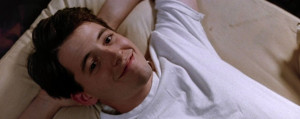 ands the test of time, and even meets the basic political correctness threshold.
ands the test of time, and even meets the basic political correctness threshold.
Hughes hit the mark with Ferris Bueller, and it’s place in comedic cinema history is well-deserved. As a geekily fabulous side note, Ferris has a Killing Joke poster in his bedroom. Yesssssss.
A few words need to be said about Sixteen Candles, which was released in May of 1984 and made seventeen million in profit. I must have all but forgotten this movie, because I was freshly disturbed by some of its content. Granted, I’ve had three daughters since last I saw the film, but regardless of parental status, the movie is rife with offensiveness that would most likely not be tolerated today.
To begin, the entire premise of the film is that sixteen year old Samantha writes down the name of who she wants her first sexual experience to be with and Jake, the recipient of her hormonal attentions, accidentally receives the note. He then pursues Samantha throughout the film, saying he wants someone to love, but seriously? Eighteen year old boy finds out a girl wants to have sex with him, then dumps his popular blonde hottie to find true love with a sixteen year old sophmore…..hrmmmmm. Let’s try that again: Senior wants to get laid and chases after an innocent virgin he knows is a sure thing. Yes, that’s about right.
To add to the 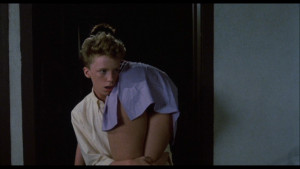 distaste, is the incessant use of the word “faggot,” an embarrassingly racist portrayal of an Asian character, and a passed-out drunk girl given by Jake to another guy to do with what he will. I tried to find the nostalgia and endearment in this film that would explain it’s popularity, but admittedly am at a loss. The saving grace is the comedic moments in the film related to Samantha’s sister’s wedding and her family forgetting her birthday. Other than that, I’m struggling with this one.
distaste, is the incessant use of the word “faggot,” an embarrassingly racist portrayal of an Asian character, and a passed-out drunk girl given by Jake to another guy to do with what he will. I tried to find the nostalgia and endearment in this film that would explain it’s popularity, but admittedly am at a loss. The saving grace is the comedic moments in the film related to Samantha’s sister’s wedding and her family forgetting her birthday. Other than that, I’m struggling with this one.
Certainly, Hughes’s work is not confined to the films mentioned here. The Breakfast Club was his other notable “Brat Pack” movie and, like Ferris Bueller, it’s appeal is justified and timeless. He went on to make Home Alone, a couple of National Lampoon movies, Weird Science, Some Kind of Wonderful, and many others with varying degrees of success.
By no means is it my intention to take away from the fond feelings we Gen-Xers carry with us for that lippy redhead and vinyl and big hair, or even for Macaulay Culkin with his mouth all wide open. So, in celebration of the thirtieth birthday of Andie, Blane, Duckie and Ferris, let’s focus on the fact that we loved John Hughes when we were kids, and so we love him now, because his work brings back memories of less complicated times. Does this excuse some of the completely inexcusable content? No. Are offensive and inappropriate movies made in 2016? Yep. Perhaps we need to take Hughes’s films as representations of the time in which they were made– before political correctness, before the term “rape culture” or “Gamergate”, before homosexuality began to become less stigmatized. Though not to be taken lightly, perhaps we can view our lack of sensitivity to these issues, and the progress we’ve made, as a sort of tough-love nostalgia: Hey…remember when we used to call each other faggots? Man, we were clueless…can you imagine?
I shall conclude this piece by st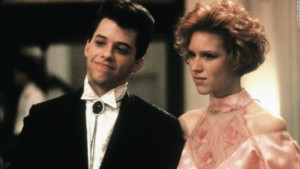 ating that the soundtrack to Pretty in Pink paves the road to heaven. If You Leave…can it get any better? It’s those moments, as Andie walks into the prom in her homemade dress and Duckie awaits her (omg choose him), with Orchestral Maneuvers in the Dark playing in
ating that the soundtrack to Pretty in Pink paves the road to heaven. If You Leave…can it get any better? It’s those moments, as Andie walks into the prom in her homemade dress and Duckie awaits her (omg choose him), with Orchestral Maneuvers in the Dark playing in
the background–it’s those moments that make John Hughes, John Hughes.
For better or for worse, he captured the attention of a generation, spoke the right language at the right time, and laid the groundwork for coming-of-age movies in a style that is singular and so quintessentially 80’s, we cannot help but smile in between the cringes.
Pretty in Pink was re-released in theaters this past February and included alternate endings and behind-the-scenes footage. John Hughes passed away in 2009.


